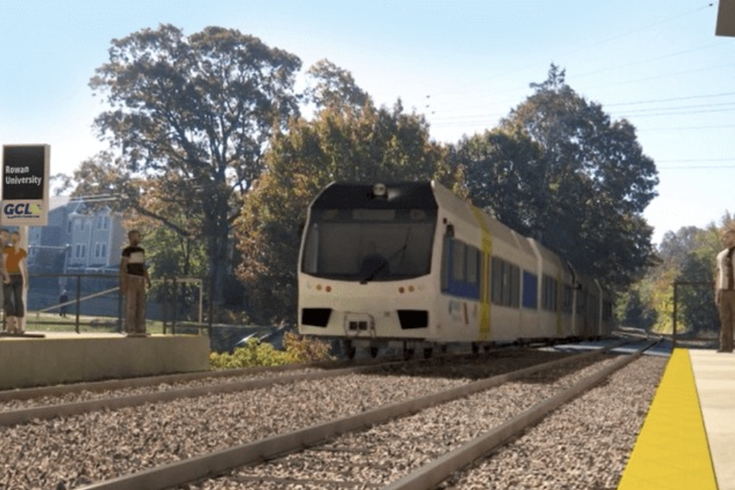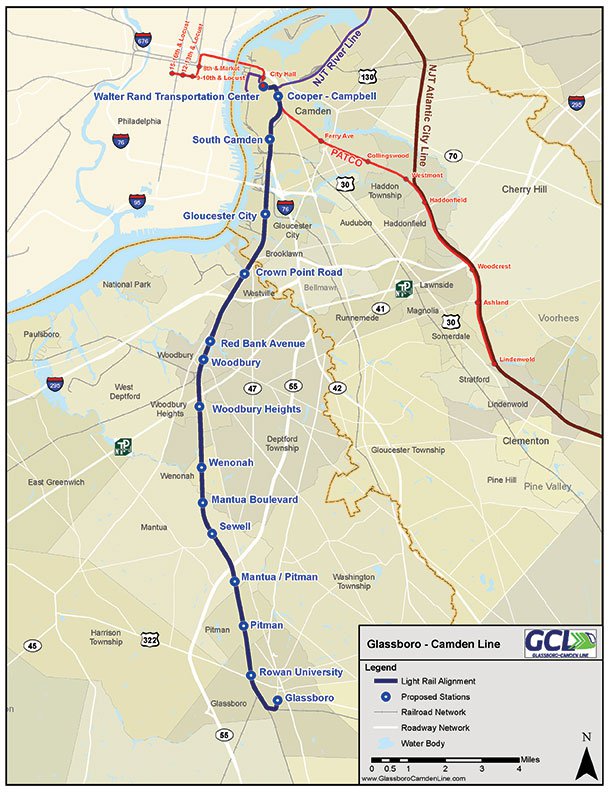
October 31, 2022
 Glassboro-Camden Line/Facebook
Glassboro-Camden Line/Facebook
The proposed Glassboro-Camden Line calls for a diesel, light rail transit route that better connects Gloucester County with the Philadelphia-Camden metro area. The proposal includes 14 new train stops in South Jersey.
Plans to bring a new light rail route along an 18-mile stretch of South Jersey, from Glassboro to Camden, took another step forward last week with the selection of two firms that will handle project management and preliminary design work.
The Glassboro-Camden light rail project was first envisioned in 2005 as a transportation initiative to extend the Philadelphia-Camden metro area. Its proponents have long argued that a lack of fixed-rail transit in South Jersey has held the region back, particularly as Gloucester County is poised for population and job growth in the next few decades.
Backed by the Delaware River Port Authority, PATCO and NJ Transit, the GCL calls for 14 new stations along an existing Conrail line using diesel, light-rail trains. The new line, similar to the River Line between Camden and Trenton, would enable riders to transfer to the PATCO Speedline for access to Philadelphia and other parts of Camden County.
 Source/GlassboroCamdenLine.com
Source/GlassboroCamdenLine.comThe fourteen stops on the proposed 18-mile Glassboro Camden Line would traverse the communities of Glassboro, Pitman, Sewell, Mantua Township, Deptford Township, Wenonah, Woodbury Heights, Woodbury, Westville, Brooklawn, Gloucester City and Camden.
Last week, GCL officials announced a new joint venture, called South Jersey Transit Partners, that will oversee the next phase of the project. Dallas-based infrastructure consulting firm AECOM will partner with Manhattan-based STV on the preliminary engineering and design work and project management.
"The GCL is an important initiative to improve mobility by offering quick, reliable and frequent rail service to the region," said Bane Gaiser, chief executive of AECOM's U.S. East and Latin America region. "Our SJTP joint venture is incredibly proud to continue our crucial work, leveraging our deep understanding of the GCL's objectives, the project’s scope, stakeholder engagement, and public needs to successfully deliver a transportation option that will have a positive impact on the day-to-day lives of South Jerseyans."
The upcoming phase is expected to take three years, encompassing design specifications and contract documents, right-of-way acquisitions and easements, and land and utility surveys. SJTP also will continue community relations and public involvement over the coming years.
Some critics of the GCL have questioned why the proposal favors diesel over electric vehicles, and whether the demand for public transit will actually meet backers' expectations. There also are concerns about local disruptions relating to construction activity and the anticipated cost of the project, which was last estimated in 2009 to be $1.6-$1.8 billion. That estimate has not changed on the GCL website.
The next phase of the project aims to "define the overall project configuration and develop a strategic construction plan," officials said.
An environmental impact report released last year projected that the GCL would run daily from 5 a.m. to midnight and would carry up to 300 passengers at a time on two sets of trains. Service would operate every 15 minutes during peak and midday periods, and every 30 minutes during late-night periods. The average one-way trip for the entire line would be approximately 35-40 minutes.
Those who support the GCL view the project as a critical step to greater accessibility throughout the region, arguing it will reduce traffic congestion, boost transit options for students, improve the region's business outlook and raise property values. Supporters also point to ongoing redevelopment in Camden, where the Walter Rand Transportation Center already is undergoing a $250 million overhaul that will bolster investments in rail development in South Jersey.
"We expect public transportation to be even more important in the future," DRPA CEO John T. Hanson said. "The time is now to build permanent infrastructure that will provide the residents and businesses in South Jersey with safe and equitable access to key destinations and to create opportunities for business expansion and employee recruitment."
The upcoming phase of the study is expected to be funded with $200 million from the quasi-private South Jersey Transportation Authority. A preliminary timeline for the GCL to begin service after design and construction are completed is 2028.